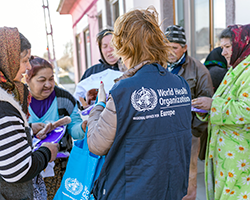Risk communication and community engagement in emergencies

WHO/Costin Simion
Communicating risks effectively in emergencies by engaging communities is a vital public health intervention. It can save lives during emergency situations and, as such, should be considered an investment in people’s health, safety and security.
Risk communication is one of the eight core capacities that all WHO Member States commit to develop and implement as States Parties to the International Health Regulations (IHR) (2005). It is also a component of preparedness within the Pandemic Influenza Preparedness (PIP) framework. Risk communication and community engagement (RCCE) is required throughout the prevention, preparedness, response and recovery phases of a serious public health event.
The vital role of RCCE has become more broadly acknowledged in recent years, partly as a result of the Ebola outbreaks in West Africa and in the Democratic Republic of the Congo and the Zika virus disease outbreaks in the Americas.
These events have underlined the need for timely and transparent messaging as the backbone of RCCE. They acknowledge that information sharing should be two-way between relevant stakeholders, and that effective RCCE needs to be based on community engagement and empowerment to build trust, foster behavioural impact and contribute to crisis control.
The Emergency Risk Communication five-step capacity-building package
The WHO Health Emergencies Programme (WHE) in the WHO European Region has been developing this critical capacity since 2013, and has scaled up efforts from 2017 with the provision of a five-step package to guide its countries to establish and implement systems for an effective response through an all-hazard Emergency Risk Communication (ERC) plan.
This unique, sustained and country-tailored project aims to increase the effectiveness of the ERC response, in concert with multisectoral partners. First launched in 2018, it was rolled out to the global Organization, following its proven use as an effective tool for numerous countries in the WHO European Region.
The main lessons learnt from the process are a need for dedicated human and financial resources for ERC, for better-structured coordination among response agencies, and improved expertise to listen to and engage with communities, and to test messaging while preparing key influencers, such as health care workers, with effective ERC tools and resources.
The Regional Office has also adopted the SocialNET training, a global initiative of WHO to improve the capacity of countries to engage communities through enhanced use of social science-based interventions (SSIs) before, during and after health emergencies.



